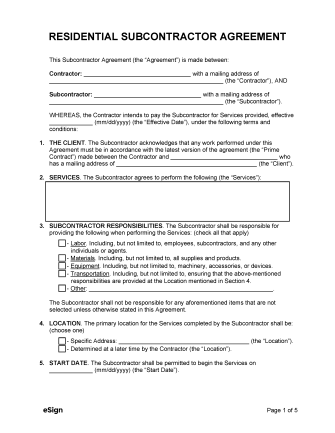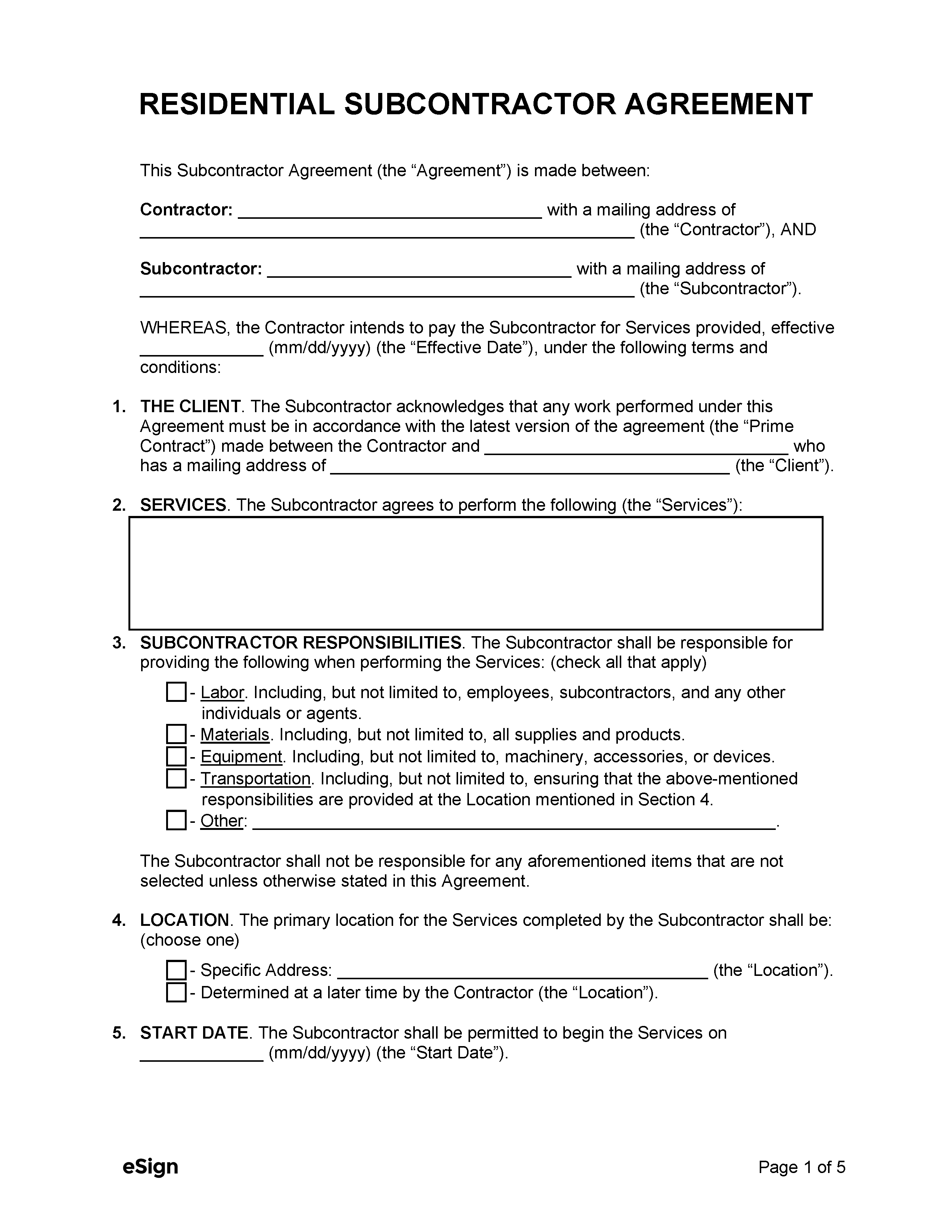Contract Essentials
Though each residential construction project has different needs, most residential subcontractor agreements will contain the following:
- Party names. The contract always identifies the contractor, subcontractor, and client.
- Services. It is essential to relay what work the subcontractor will do for the prime contractor.
- Responsibilities. It should be noted if the subcontractor is responsible for providing labor, materials, equipment, or transportation.
- Important dates. The contract must note certain dates, such as when the subcontractor will begin work and any deadlines.
- Compensation. The contract must state what, when, and how the subcontractor will be paid.
- Termination. It should be stated if the contract may be terminated early, and if so, how many days’ notice the terminating party needs to give beforehand.
- Disputes. The agreement should relay how disputes will be handled between parties.
- Signatures. The contract will be valid once the contractor and subcontractor sign it.
Sample
Download: PDF, Word (.docx), OpenDocument
RESIDENTIAL SUBCONTRACTOR AGREEMENT
1. THE PARTIES. This Subcontractor Agreement (“Agreement”) is made between [CONTRACTOR NAME], with a mailing address of [CONTRACTOR ADDRESS] (“Contractor”), and [SUBCONTRACTOR NAME], with a mailing address of [SUBCONTRACTOR ADDRESS] (“Subcontractor”).
WHEREAS, the Contractor intends to pay the Subcontractor for Services provided, effective [DATE], under the following terms and conditions:
2. THE CLIENT. The Subcontractor acknowledges that any work performed under this Agreement must be in accordance with the latest version of the agreement made between the Contractor and [CLIENT NAME], who has a mailing address of [CLIENT ADDRESS] (“Client”).
3. SERVICES. The Subcontractor agrees to perform the following: [LIST SERVICES] (“Services”).
4. RESPONSIBILITIES. The Subcontractor shall be responsible for providing the following when performing the Services: [LIST RESPONSIBILITIES]
The Subcontractor shall not be responsible for any items that are not listed unless otherwise stated in this Agreement.
5. LOCATION. The primary location for the Services shall be [ADDRESS].
6. START & END DATES. The Subcontractor shall be permitted to begin the Services on [DATE] and shall complete the Services in a reasonable time period in accordance with industry standards.
7. PAYMENT. The Contractor shall pay the Subcontractor $[AMOUNT] per [PAYMENT BASIS (E.G., HOUR)] for the Services. Payment shall be made by [PAYMENT METHOD] every [PAYMENT FREQUENCY].
8. TERMINATION. Either party can terminate this Agreement by providing [#] days’ notice to the other party.
9. SUBCONTRACTING. The Subcontractor shall (☐ Have | ☐ Not Have) the right to subcontract, either in part or in whole, the Services authorized under this agreement.
10. DISPUTES. If a dispute arises concerning the provisions of this Agreement or the performance of any of the parties mentioned, the parties hereby agree to settle the dispute by equally paying for binding arbitration as regulated under the laws in the state where the Services are being performed.
11. REQUIRED LICENSES. All parties to this Agreement, including other subcontractors and the parties’ employees and agents, must be licensed per state laws governing their trade.
12. INDEMNIFICATION. The Subcontractor shall indemnify and hold the Contractor and Client harmless from any loss or liability from performing the Services under this Agreement.
13. INDEPENDENT CONTRACTOR. The Subcontractor is an independent contractor, and neither the Subcontractor nor their employees or contract personnel are or shall be deemed the Contractor’s employees.
14. GOVERNING LAW. This Agreement shall be governed under the laws in the State of [STATE].
IN WITNESS WHEREOF, the parties have executed this Agreement on the dates written hereunder.
Contractor Signature: _____________________ Date: [DATE]
Print Name: [CONTRACTOR NAME]
Subcontractor Signature: _____________________ Date: [DATE]
Print Name: [SUBCONTRACTOR NAME]

